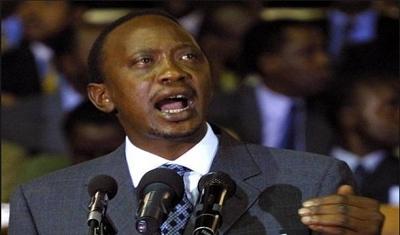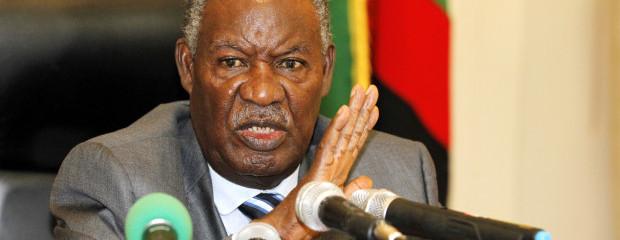Kenya Following Sudan Tactics to Undermine ICC – By Stephen A. Lamony


Uhuru Kenyatta is the first person to be elected President of a country whilst under ICC indictment.
The Rome Statute of the International Criminal Court (ICC) obliges states parties to cooperate with the Court in regards to its investigations and prosecutions. It is perhaps not too surprising then that Sudan, which never ratified the Rome Statute, has not cooperated with the Court’s investigation in Darfur. What is novel is that Kenya””which joined the ICC in 2005″”is now practicing its own form of non-cooperation that in many ways mirrors that of Sudan.
International community appeals for ICC assistance
In both Sudan and Kenya, ICC intervention was prompted by the findings of independent international bodies. This is key to understanding these states’ interactions with the Court.
In March 2005, the United Nations Security Council (UNSC) referred the situation in Darfur, Sudan for investigation by the ICC prosecutor. This came after a UN Commission of Inquiry in Darfur revealed that crimes against humanity and war crimes had been committed and that the Sudanese legal system was incapable of dealing with human rights violations. Later that year, the prosecutor opened a full investigation.
In the summer of 2008, the prosecutor requested the issuance of arrest warrants for President Omar Ahmad Al-Bashir and other suspects. For many African and Arab diplomats the decision to open investigations in Darfur wasn’t a big deal. They were stunned, however, that a serving head of state could be prosecuted by the Court following a referral from the Security Council.
Two years after the Darfur referral, Kofi Annan handed over the Waki Commission envelope – containing the names of those suspected of being primarily responsible for Kenya’s 2007-08 post-election violence – to the ICC prosecutor. In November 2009, the prosecutor requested permission from ICC judges to uses his powers to open an investigation into the violence, leading to charges against six prominent Kenyans, including the future president and vice president.
Measures to escape ICC prosecutions
The Kenyan suspects and their allies in government have used the government apparatus to establish alternative rule of law mechanisms. In April 2012, President Mwai Kibaki lobbied his peers to pass a resolution extending the jurisdiction of the East Africa court of justice (EACJ) to cover crimes against humanity. Kibaki’s intention was to ensure that Uhuru Kenyatta, Francis Muthaura, William Ruto and Joshua Sang did not go to the ICC. Although the heads of state of the East African community agreed to extend the jurisdiction of the EACJ in April 2012, the vice president of the East African Law Society, James Mwamu, complained that “The EACJ has no jurisdiction whatsoever to deal with criminal matters and the move by the legislative assembly to pass that motion is absolutely illegitimate”.
The Kenya National Human Rights Commission (KNHRC) Commissioner Lawrence Muite also challenged the government’s efforts to transfer the ICC cases to the EACJ. “This is not about justice for Kenyans. It is all about politics and protecting a few individuals. They seek to add protocols to the EACJ just for the sake of four people”.
It is worth noting that as early as 2006 and 2007, civil society organisations in East Africa had been advocating for extension of jurisdiction of the EACJ to include human rights violations. However, this idea was hijacked by Kibaki to protect the four suspects indicted by the ICC.
Similarly, the Sudanese government established the Special Criminal Court for Events in Darfur (SCCED) on June 7, 2005 – a day after the prosecutor of the ICC announced that he was going to commence investigations in Darfur. However, the cases at the SCCED do not address major issues of accountability in Darfur.
The ICC prosecutor gave both Kenya and Sudan ample time to undertake genuine and effective prosecutions at the national level before moving forward with his prosecutions.
Both countries have also tried to have their ICC cases deferred by the Security Council (under Article 16 of the Rome Statute, which allows for a one-year deferral) and have sought African Union backing for their endeavours. However, neither has found a receptive audience among Security Council members.
Politicization of the ICC process
By appealing to tribal and ethnic sentiments – portraying the ICC as a tool of Western imperialism””politicians in Sudan and Kenya have brainwashed many citizens and discredited the ICC and the Security Council in their countries, their region and beyond.
Extensive propaganda has been used to spread lies and turn their citizens against the Court and the Security Council while improving the credibility of suspects wanted by the ICC.
In the run up to the March 2013 elections, ICC suspect and Kenyan President-elect Uhuru Kenyatta stated that Kenyans would be voting on a “referendum against the ICC.” In relation to the prosecutor’s decision to drop charges against co-accused Francis Muthaura, he said “if Muthaura’s case is collapsing, is that not an indication even mine will go nowhere?” Kenyatta’s lie was exposed by ICC Prosecutor Fatou Bensouda on March 20, 2013, when she stated very clearly that he will face trial because the charges against him have not been dropped.
Over the same period, the Kenyan Daily Post published a fake statement purporting to be from the former ICC prosecutor Luis Moreno Ocampo apologizing to Kenyans for indicting four suspects of the 2007/8 post election violence. The statement entitled “Romour: is it true?? Uhuru/Ruto “˜s ICC cases…Exclusive apology of Moreno Ocampo to Kenyans” was completely false. While giving a speech with the headline “Ten Years of the International Criminal Court: Is the World Better Equipped to Deal with Mass Atrocities?” at the Roosevelt House Public Policy Institute, Hunter College in New York City on the 19th of March 2013, Luis Moreno Ocampo denied ever writing an apologetic letter to Kenyans.
In his condemnation of the Al-Bashir arrest warrant, former Sudanese UN Ambassador Abdalmahmood Abdalhaleem Mohamad claimed that the ICC is tool of imperialism, claiming that certain permanent members of the Security Council – the UK, France and the United States – were using it to dominate and destabilize Sudan and gain access to its oil and land. He went on to say that the Court reflects the brand of Euro-American justice that had destroyed Iraq, Afghanistan and Gaza.
Kenyans engaging legally
In May 2011, the Kenyan government pursued an admissibility challenge claiming that, as a result of the adoption of a new constitution and judicial reforms, it was now capable of investigating and prosecuting ICC suspects. However, pre-trial judges rejected the challenge, stating that there was no evidence of a national investigation into the 2007-08 post-election violence. While explaining the decision to drop charges in the Muthaura case on March 11, 2013, Bensouda complained of a lack of cooperation: “Despite assurances of cooperation, the government of Kenya has provided only limited assistance to the prosecution and failed to provide the prosecution with access to witnesses or documents which may shed light on the Muthaura case.”
Kenyan ICC suspects have never argued that they are senior government officials and are also entitled to immunity. In August 2011, President Kibaki axed William Ruto from his cabinet as higher education minister and Kenyatta and Muthaura both resigned from their positions as finance minister and head of public service and cabinet secretary, respectively, after the ICC charges had been brought against them.
Sudan, on the other hand, attempted to challenge the jurisdiction of the court and admissibility of the Darfur situation through a Court-appointed defense counsel. Pre-trial judges rejected that request stating that the counsel didn’t have the right to make such a challenge. Sudan also argues that Al-Bashir is entitled to immunity based on Articles 98(1) and 27 of the Rome Statute. In fact, Article 27 stipulates the irrelevance of official capacity, in particular concerning heads of state.
International community must stand firm on need for ICC prosecutions
In conclusion, Kenya isn’t living up to its obligations as an ICC member state in engaging with the Court from a strictly legal perspective. It has far too readily followed Sudan’s lead in attempting to shield suspects from justice through a variety of means.
Stephen Lamony is a Senior Adviser, at the Coalition for the International Criminal Court. The views expressed here are mine and do not reflect the official position of the CICC.







The african despots are the rock and the ICC is the hard place and all the victims are trapped in between. The ICC is a great tool for curbing impunity, such a shame then that it was tied to politics from the very start. One cannot escape the fact that poor countries were often forced to ratify the document as part of Aid conditions, nor the fact that big powerful countries can violate human rights abroad (invasions of Iraq and Afghanistan, drone attacks etc) and absolutely get away with it without even a peep from the ICC, never mind the Security Council which is already compromised anyway. Yes, the ICC is part of the apparatus of western domination, and I say this as a human rights lawyer, concerned about human rights abuses in my homeland, Kenya. Its application is selective, and although its supporters cynically trumpet the fact that Eastern Europeans have been tried at the court as ‘proof’ of its impartiality, one need only consider the fact that the likes of George W Bush still walk free even though the whole world knows the invasion of Iraq was illegal, even though we all know the pretext for invading Iraq was flimsy and then there is the rendition fiasco involving more powerful countries with their torture alliances with questionable regimes, how come nobody talks about these? I can only support the ICC half-heartedly as an African, because at the end of the day, victims must have justice, and Africa has a poor record of providing that, but ICC impartiality? Come on, who are we kidding!
Humbly i would request icc to leave alone the three kenyan suspects because the case against them was made by opposing party by then and thats why these witnesses feel to withdraw their participation. Truly speaking no clear reason why they could exit themselves if they can give the truth and reliable evidence. Am sure due to the fact that these termed as key witness have dropped their participation then the remaining witness will not give a TRUSTED and CONVINCING evidences
What could appear at first glance as an bewildering oversight and lack of care, might at second visit not even be the author’s fault at all – namely, that he did not analyse nor at all mention the ICC’s single most important decision on the consequences of state party non-cooperation.
The reason may be simple: the decision of pre-trial chamber II (coram Trendafilova, Kaul, Tarfusser – the same judges thus ruled and rule on the Kenyan pre-trial stage) of 26th March 2013 as usually may have appeared on the court’s public website only a few days later, and the author’s manuscript may well have been written and submitted for publication already at this time. Nevertheless, he would probably do well to include the reference in future writings.
Source: ICC-02/05-01/09-151
http://www.icc-cpi.int/iccdocs/doc/doc1573530.pdf